The week ahead in Parliament
- Published
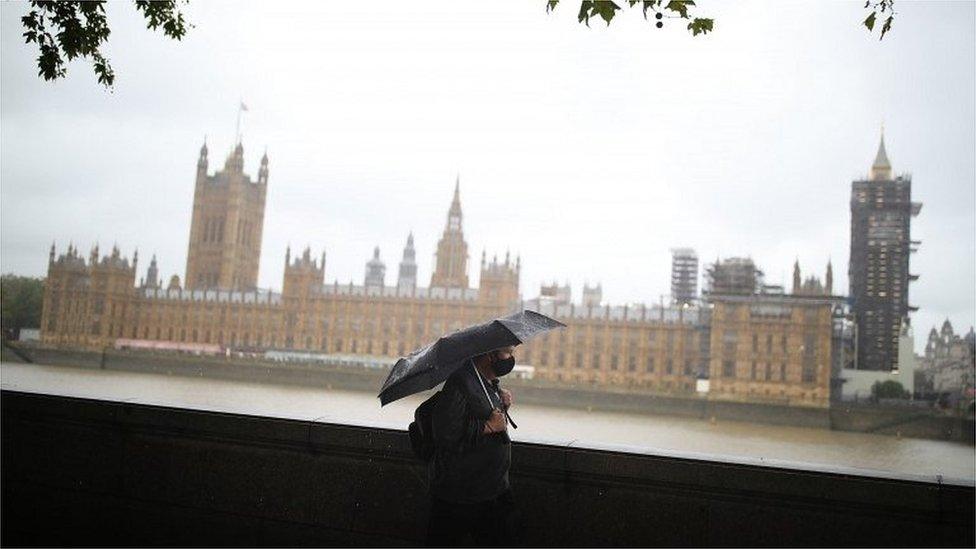
In the shadow of the Margaret Ferrier incident, next week in Parliament will doubtless see a redoubled emphasis on Covid safety and social distancing, and probably some angry questioning about the exact timeline of the erring MP's visit to Westminster, her positive test for the virus, and her notification of her SNP colleagues and the parliamentary authorities.
There's a lot of anger and quite a bit of politics tangled around those questions.
Otherwise, it's a week of heavy legislating, with bills bouncing between the Commons and the Lords, and controversy over measures intended to protect military veterans from vexatious prosecutions (critics say it could prevent prosecutions for serious human rights abuses) and to authorise criminal conduct by undercover operatives to protect their cover (critics say that could amount to a "license to kill").
Meanwhile, there are an awful lot of coronavirus regulations before the Commons and the Lords. So will MPs' fury at not being consulted about regulations - which have been signed into law by ministers - now translate into diligent debates, as ministers start bringing them before the Commons? We'll find out on Tuesday, when the "rule of six" regulations are considered (after the event) by both the Commons and the Lords.
But for me, all pales beside the arrival of one of the great heroes of English cricket in the Upper House. All hail, Lord Botham!
Here's my rundown of the week ahead:
Monday 5 October
The Commons opens (14:30) with an hour of Housing, Communities and Local Government questions - which is normally followed by either a post-weekend ministerial statement or an urgent question (although the previous week, unusually, neither occurred).
It is also possible that Mr Speaker will weigh with a reminder to MPs about Covid safety, following the Margaret Ferrier case.
The day's main legislating is on the second reading of the Covert Human Intelligence Sources (Criminal Conduct) Bill, another measure which touches on the state of the rule of law and law-breaking. The bill provides a power for police or intelligence personnel who have infiltrated some group to participate in conduct which would otherwise be criminal, on the argument that they have to establish their credibility by being breaking the law.
This is not a new issue, but the government now wants a clear legal framework in place. Amnesty International have said the bill could "end up providing informers and agents with a licence to kill," adding it is "deeply alarming that the proposed law does not explicitly prohibit MI5 and other agencies from authorising crimes like torture and killing."
One point to note is that the government wants the detail of the bill scrutinised by committee of the whole House on Thursday 15. The upside is that this will allow all MPs to participate; the downside will be the lack of evidence hearings in a Public Bill Committee, which would certainly have been pretty interesting from any number of points of view. However, the Human Rights Committee may well hold an inquiry to plug the gap.
In the newly-re-opened Westminster Hall the Petitions Committee has scheduled a debate on extending maternity leave by 3 months with pay in light of the pandemic (16:30). This is based on e-petition 306691, which argues: "This time is for bonding and social engaging with other parents and babies through baby groups which are vital for development and now everything has been cancelled."
The petition attracted 238,009 signatures and led to a report from the committee, which recommended that existing arrangements should be reviewed in the light of concerns about the impact the pandemic is having on children's development and mental health. The government responds that the UK's maternity leave offer is already amongst the most generous in the world - up to 52 weeks of leave are available, 39 weeks of which are paid - and ministers have no plans to extend it.
That will be followed by a debate on three petitions on Brexit. There's e-petition 241848, which reads: "Halt Brexit For A Public Inquiry - The UK's departure from the EU looms but questions remain about the legitimacy of the referendum. The Electoral Commission said illegal overspending occurred during the referendum. Were the vote/any subsequent political acts affected? Article 50 was triggered. Was the overspend known about then?" This attracted 111,918 signatures.
Alongside it will be debated e-petition 300412 - "Extend the transition; delay negotiations until after the coronavirus outbreak," - which received 107,436 signatures, and e-petition 250178, which asks: "To establish a public inquiry into the conduct of the 2016 EU referendum.
There is now strong evidence of serious misconduct during the 2016 EU referendum, including interference by foreign actors and governments. This must be investigated under the Inquiries Act (2005)." This received 109,430 signatures.
A Cabinet Office minister will respond to the debate. Incidentally, there will be no virtual participation in these debates - and there will be a limit on the number of MPs allowed in the Westminster Hall debating chamber.
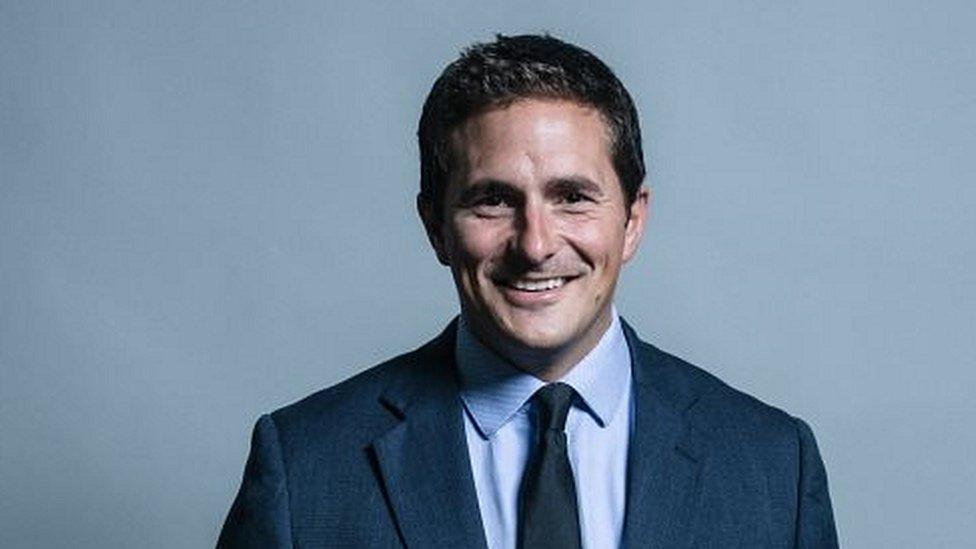
Johnny Mercer will answer questions on the prosecution of veterans
On the committee corridor, watch out for Veterans Minister Johnny Mercer's appearance before the Human Rights Committee (14:30) as part of their scrutiny of the Overseas Operations (Service Personnel and Veterans) Bill - which includes controversial measures to limit prosecutions against service personnel. An army veteran himself, Mr Mercer has been a robust backer of a change in the law to protect them from "vexatious" prosecutions.
Public Accounts (14:30) has a session on the Nuclear Decommissioning Authority's management of the Magnox contract, to decommission a particular type of nuclear power station, based on a report from the financial watchdog, the National Audit Office, external, which is critical of the NDA's "fundamental failures in the Magnox contract procurement."
In the Lords (13:00) two more new peers take their seats - first Lord Moylan, who was chief airport adviser to Boris Johnson when he was mayor of London. He backed a new airport to the east of London to replace Heathrow, and was the mayor's principal advisor on Crossrail 2. Second will be the cricketing demigod, Lord Botham.
Lords' question time ranges across complaints about adult social care following the suspension of all casework by the Local Government and Social Care Ombudsman between 26 March and 29 June, provisions for people with learning difficulties and autism during the pandemic, digital connectivity for school students' and the impact of quarantine provisions on civil aviation.
Then peers move on to the second day of report stage consideration of the Immigration and Social Security Co-ordination (EU Withdrawal) Bill. Watch out for amendments on safe asylum and family reunion routes for unaccompanied children, and on children in care getting status under the EU settlement scheme from Labour's Lord Dubs, who has long campaigned on this issue.
Another amendment to note is on giving people with settled status physical proof of their immigration status, from the Liberal Democrats' Lord Oates. And the Liberal Democrat Lady Hamwee has an amendment to put a fixed time limit on immigration detention - so that people cannot be held indefinitely.
There will be quite a number of votes, not least because a couple had to be held over from the previous report stage day, when the online voting system went down.
Tuesday 6 October
The Commons opens (11:30) with an hour of Health and Social Care questions. The day's Ten Minute Rule Bill, from Conservative Pauline Latham, sets a minimum age of 18 for entering into a marriage or civil partnership - she wants to criminalise child marriage.
That is followed by an hour to consider of Lords amendments to the Prisoners (Disclosure of Information about Victims) Bill. This is the measure, known as "Helen's Law," which will allow the Parole Board to take into account a prisoner's failure to disclose where the remains of murder victims are hidden, or to disclose the identities of children in indecent photographs. The government is resisting a Lords amendment to create a database of victims' families for cases where prisoners cause continuing distress.
Then MPs move on to the committee and remaining stages of consideration of the Private International Law (Implementation of Agreements) Bill - which was heavily amended in the Lords, where it started. Peers removed a clause that would have given UK and devolved ministers powers to implement through regulations any international law agreement relating to private international law, on the argument that this gave them far too much power. The government now want to re-insert this section in the Commons.
Former justice minister Jonathan Djanogly and Justice Committee chair Bob Neill are on manoeuvres over this, and seem to be of like mind with the shadow justice secretary David Lammy and the SNP's Joanna Cherry. And while they may not be able to muster the votes to defeat the government, the argument will be watched by the Lords, who may not appreciate the Commons sending back exactly the clause they had deleted.
What will then follow is a bout of parliamentary ping-pong, with the bill bouncing between the two Houses until some agreement is reached. It's worth noting that the government lost on this issue by 87 votes in the Lords, and that the superlawyers who pushed the amendment are not shy of fighting back on this kind of constitutional issue.
Incidentally, they are not resisting the section of the bill which will put the 2007 Lugano Convention into law - this sets out rules on which national courts have jurisdiction in cross-border civil and commercial disputes.
Next comes the first Commons debate on a pandemic regulation since ministers promised to be more assiduous in consulting Parliament about new restrictions. The debate is on the Health Protection (Coronavirus, Restrictions) (No. 2) (England) (Amendment) (No.4) Regulations 2020, which tightened restrictions on gatherings to reduce the public health risks from Coronavirus - introducing the "rule of six". It's a debate after the event, because they came into force at 12.01am on 14th September.
In Westminster Hall (09:30) Labour's Florence Eshalomi leads a debate calling for the government to provide more specialist services for gang associated girls - young women who are either the victims of gang violence or caught up in the gangs themselves. She says most of the organisations seeking to divert gang members out of criminal activity are focused on young men, while the young women affected by gang violence are almost invisible to the authorities, even if they are the ones doing most to hold families together and protect children or siblings.
As a member of the Greater London Assembly before coming into the Commons, she produced a report on what was needed. Other debates include one from Westminster MP Nickie Aiken, who represents London's theatre district, on the contribution of theatres, live music venues and other cultural attractions to the local economy (11:00).
The Digital, Culture, Media and Sport Committee has a one-off evidence session to examine the issue of contested monuments, following protests and debate about statues and memorials in public spaces like the case in Bristol of the statue of Sir Robert Geffrye, who made part of his money from the slave trade.
The hearing will focus on the role of physical heritage, the DCMS's involvement in its protection and preservation, and the work of Historic England.
It will hear from the mayor of Bristol, Marvin Rees, and witnesses from the Royal Institute of British Architects and Historic England. It will focus on how decisions about the future of this physical heritage are made, how different interests are considered and the role of government.
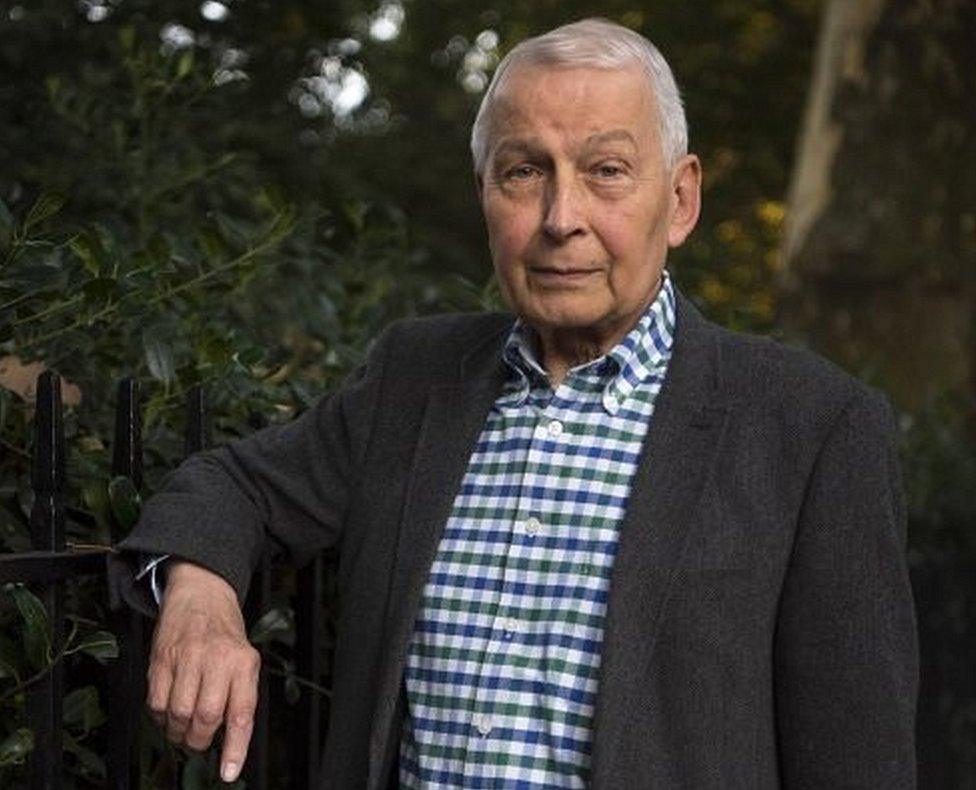
He's back: Long-serving MP Frank Field will enter the Lords
There's a heavy-duty session of the Public Administration and Constitutional Affairs Committee (09:30) which will take evidence on the government's Constitution, Democracy and Rights Commission from a series of constitutional savants - former Supreme Court judge Lord Sumption, former Clerk of the Commons Lord Lisvane, and UCL Constitution Unit's Professor Meg Russell. Anoraks will be worn.
Treasury (09:30) will take evidence on the economic impact of coronavirus, and Foreign Affairs (14:30) has a session with the foreign secretary, Dominic Raab
In the Lords (12:00) another pair of new arrivals take their seats: Lord Sikka, emeritus professor of accounting at the University of Sheffield, who will sit as a Labour peer, and Lord Field of Birkenhead, AKA Frank Field, the Labour MP who quit the party and fought (and lost) his Birkenhead seat as a Social Justice Party candidate in 2019. A poverty campaigner and Brexit supporter, he is one of a clutch of Labour Brexiteers nominated to the Lords by Boris Johnson.
Lords' question time covers the date the government was informed by the government of Ireland of its plans to quarantine passengers travelling from Great Britain to the Republic of Ireland (that's from Ulster Unionist, Lord Empey), pandemic support for the transport industry, and the next meeting and agenda of the UK Government-Northern Ireland Executive Joint Board.
Two statements from ministers are expected - on the 10pm closing time on the hospitality industry and on the new lifetime skills guarantee.
Then peers consider another set of regulations - starting with a motion to approve the same "rule of six" regulation being discussed in the Commons. Here it faces a regret motion from the Conservative former chancellor, Lord Lamont, accusing the government of a failure "adequately to consult the public in the preparation of the regulations and the impracticality of enforcing the measures". It is not expected to be pushed to a vote.
Next is the Health Protection (Coronavirus, Restrictions) (Bolton) Regulations 2020 - the local restrictions for Bolton - and finally the Draft Debt Respite Scheme (Breathing Space Moratorium and Mental Health Crisis Moratorium) (England and Wales) Regulations 2020 which gives eligible people in problem debt access to a 60-day period in which interest, fees and charges are frozen and enforcement action is paused.
Wednesday 7 October
The Commons opens (11:30) with half an hour of Scotland questions, followed by Prime Minister's Question Time.
The day's Ten Minute Rule Bill, from the Conservative, Marco Longhi, seeks to set minimum conveyancing standards, so that house-buyers will be warned about the possibility of escalating service charges or grounds maintenance fees.
Then MPs move on to the second reading of the Pension Schemes Bill - another measure already debated in the Lords. The aim is to provide the legal framework for a new species of pension, Collective Money Purchase Schemes (CMPS) - where risks would be entirely with the members but shared between them collectively.
In Westminster Hall, former Tory Leader Sir Iain Duncan Smith leads a debate on China's rapid expansion of the labour programme in Tibet, based on reports published by the Inter-Parliamentary Alliance on China (09:30). And with legislation on the issue promised, and a white paper published, the Labour MP Holly Lynch leads a debate on online harms (14:00).
On the committee corridor, Science and Technology (09:30) will be looking at the concept of a new UK research funding agency - the "UK ARPA" - with a series of academic experts and Jo Johnson, former minister for universities, science, research and innovation (09:30). The Treasury Committee (14:30) has a session on tax after coronavirus.
In the Lords (12:00) questions to ministers cover the shortage of social care workers, value for money to the taxpayer of building the new fleet solid support ships in the UK or overseas, and the cost to the taxpayer of requiring food business operators in England to display the relevant food hygiene rating score at the entrance to premises.
Then peers rattle through another job lot of regulations: first the Health Protection (Coronavirus, Collection of Contact Details etc and Related Requirements) Regulations 2020, which require designated venues to collect contact details mainly from customers, visitors and staff, store the information for 21 days, and share it with NHS Test and Trace or local public health officials, if requested.
Next are the Health Protection (Coronavirus, Restrictions) (Birmingham, Sandwell and Solihull) Regulations 2020 - another batch of local restrictions - and, finally, the Immigration Skills Charge (Amendment) Regulations 2020, which deal with the charge a sponsor must pay for a certificate of sponsorship to a skilled worker.
Thursday 8 October
The Commons day begins (09:30) with International Trade questions, followed by the weekly business statement setting out the Commons agenda for the coming week.
The main debates are on two subjects selected by the Backbench Business Committee. First the Conservative Bob Seely leads a debate on planning reform and house building targets in relation to the planning white paper - a subject that has already led to some angry exchanges when MPs debated new regulations on housing development rules.
Next DCMS Committee chair Julian Knight and Labour's Kevin Brennan lead a debate on the spending of the department on support measures for the DCMS sectors during and after the coronavirus pandemic. There's been considerable concern about the impact on the creative sector, sport and the performing arts.
On the committee corridor, watch out for the Public Accounts Committee hearing on Whitehall preparations for Brexit, with Treasury and Cabinet Office officials (10:00).
In the Lords (12:00), there's another crowd at the arrivals desk, with former Brexit Party MEP Claire Fox due to take her seat as Baroness Fox of Buckley, and Veronica Wadley - former advisor to Mr Johnson as mayor of London and the chair of the London Music Fund - becoming Baroness Fleet.
Questions to ministers range across the impact of the pandemic on low-income families with children, the UN arms embargo on Iran, and vacancies for GPs.
The main legislating is on the Parliamentary Constituencies Bill report stage, with amendments on the timing and frequency of Boundary Commission reports, appointments of Boundary Commissioners, and the degree of variation to be allowed in the size of constituency electorates.
Friday 9 October
The Commons will not be sitting, but peers will be in session to consider another job lot of regulations. First, the Health Protection (Coronavirus, Restrictions) (Obligations of Hospitality Undertakings) (England) Regulations 2020, which require pubs, restaurants, cafes etc to take reasonable measures to limit customers to parties of six and to keep tables a safe distance apart. This is another retrospective debate - the regulations come into force on 18 September.
Next are the Insolvency (Moratorium) (Special Administration for Energy Licensees) Regulations 2020 - which will give will give financially distressed energy companies breathing space from their creditors, and the Charitable Incorporated Organisations (Insolvency and Dissolution) (Amendment) (No.2) Regulations - a tidying-up measure.
- Published2 October 2020
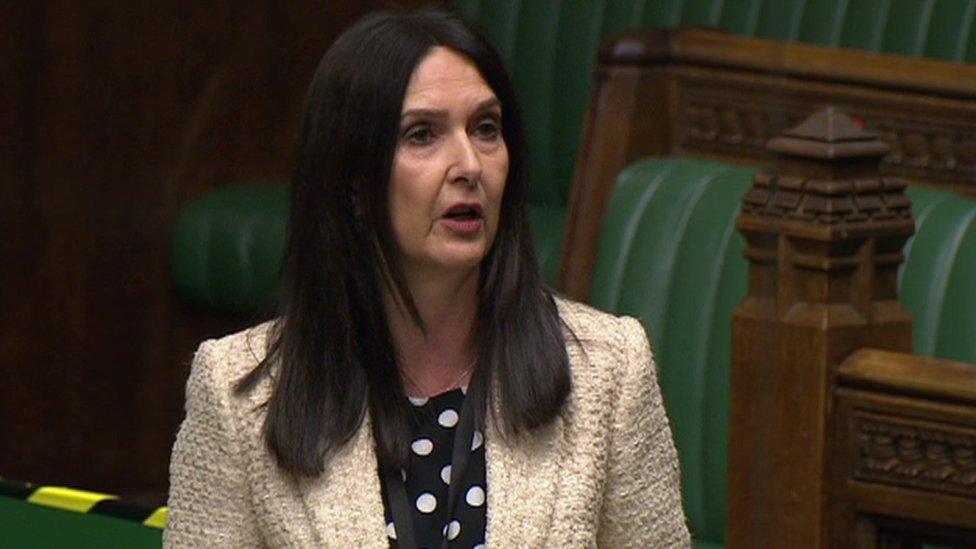
- Published30 September 2020
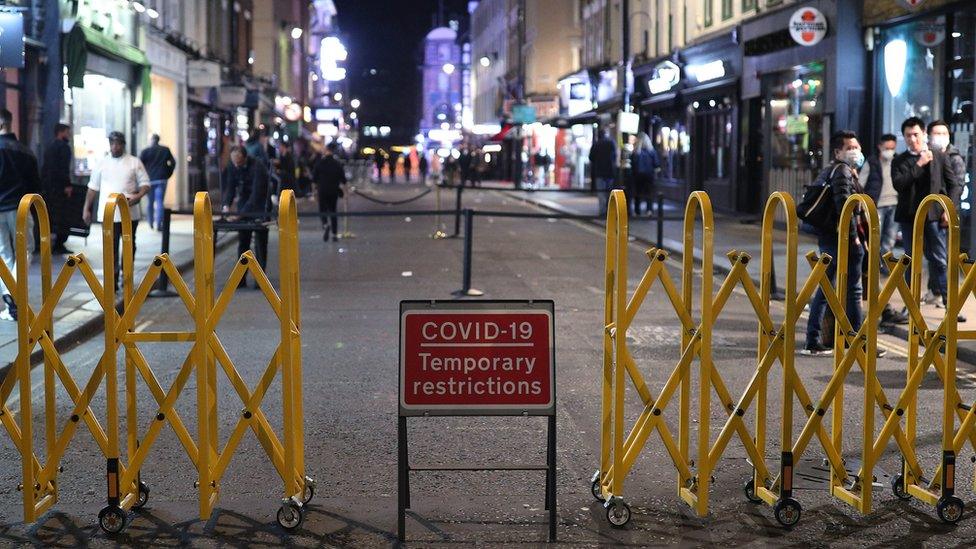
- Published18 March 2020

